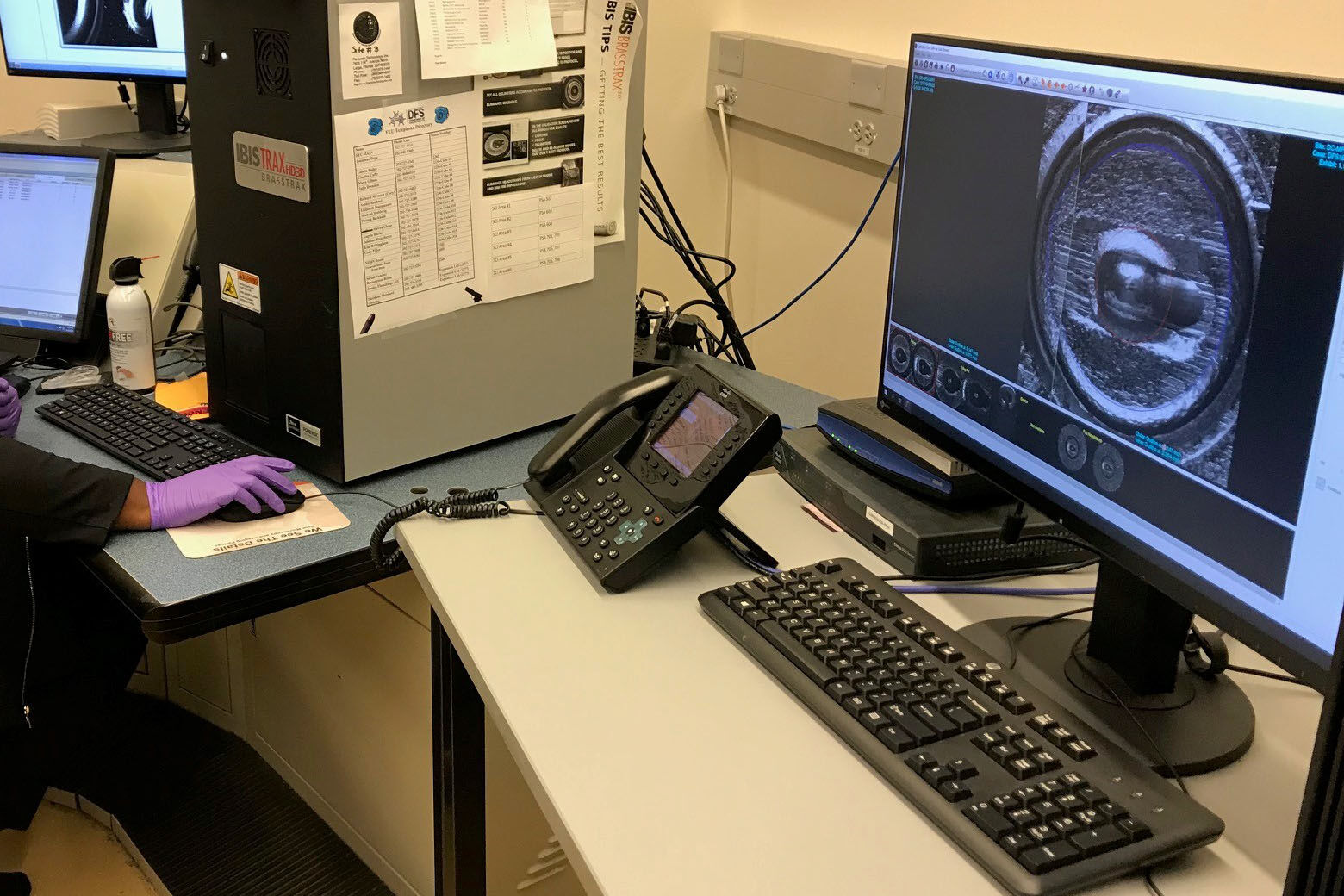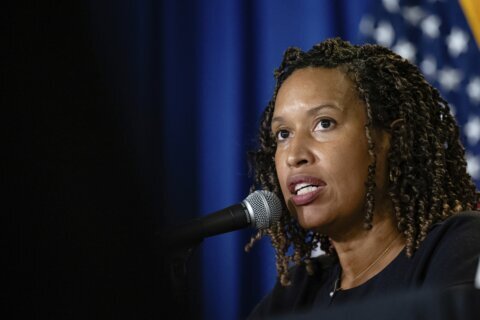
In late May, D.C. Mayor Muriel Bowser announced she was bringing in a forensic consulting firm to perform an independent review of the city’s troubled crime lab, which had just seen its accreditation stripped and is the subject of a criminal investigation over its handling of errors in a murder case.
In a letter to D.C. lawmakers, the mayor described SNA International, which is based in Alexandria, Virginia, as an “independent firm with extensive forensic sciences laboratories experience.”
But the letter didn’t mention that the company had previously done work for the lab, and was also in the running — in fact, had been preliminarily approved for — what has been described as a “critical upgrade” to the lab’s case-tracking system.
Earlier this month, the latest deal was made official: D.C.’s Department of Forensic Sciences awarded SNA International a nearly $2 million, two-year contract to implement an overhaul of the agency’s Laboratory Information Management System (LIMS). The system, which is crucial to the lab’s operations, is used to track all evidence arriving at the lab and contains reports and records of forensic examinations performed by analysts.
The potential that SNA International’s two contracts — one to roll out the new system, the other to probe the agency’s lapses — could present at least the appearance of a conflict of interest has led D.C. Council Member Charles Allen, who chairs the Public Safety and Judiciary Committee, to write to the acting head of the agency about how SNA will handle both jobs.
In a response letter, the agency suggests the two contracts are completely separate, but pledged more stringent oversight to mitigate any potential conflicts of interest.
The case-tracking contract, which was deemed approved July 10, has a not-to-exceed value of nearly $1.2 million for the first year and another $819,000 if the second option year is exercised, according to a copy of the contract posted online. The contract calls for SNA to send a small team of experts to the lab to roll out an upgraded version of the tracking software over the next few years.
In a July 7 letter to Interim DFS Director Anthony Crispino, Allen said he was writing “to gain a better understanding of SNA’s ability to provide both services and identify any potential conflicts that could arise” as the agency carries out work on both contracts simultaneously.
Allen’s letter asked whether any proposed members of the LIMS project team also would be engaged in the review of the agency’s operations, as well what steps the lab would take “to ensure that any potential conflicts of interest — or the appearance thereof — are avoided or mitigated.”
In his letter, Allen noted the agency “is currently confronting a number of issues related
to its independence, credibility, and transparency” and, as part of the audit SNA has been contracted to carry out, “SNA will presumably engage in a deep and comprehensive review of DFS’ operations and hopefully shed light on the changes that need to be made at the agency.”
In a July 13 response, Crispino suggested the simultaneous contracts wouldn’t pose any problem for the agency. He said separate teams of contract employees would be working on each contract; that no SNA employees working to review DFS operations under the audit contract will be required to evaluate the work of SNA contract employees performing the LIMS upgrade, and that the time frames and focus areas of each project are different.
“The LIMS implementation project is a brand-new software development project with specific goals and objectives for integrating the various software programs that are currently in place at the DFS,” Crispino said in the letter.
On the other hand, the audit contract is focused on getting DFS re-accredited to conduct forensic analyses and “focuses on studying issues that occurred in the past, determining their root cause, and developing corrective action and monitoring plans for moving forward,” Crispino said.
However, he said, SNA management had agreed to his request that all company employees working on either contract receive training on recognizing and reporting potential conflicts of interest. He added that the District’s Office of Contracting and Procurement will provide “an additional layer of oversight and guidance for each contract.”
Crispino’s letter said the agency would mitigate potential conflicts of interest because “my very capable management team will be on-site and overseeing contractors and their project management.”
He didn’t say what ethics training, if any, his management team will receive, or whether any agency employees, whose conduct could be scrutinized under the audit, are overseeing any aspect of the upgrade project.
The letter is at times unclear. For example, it says the contracts are separate and won’t require SNA to review its own work, but it also says the work under both contracts is “complementary.”
‘Top to bottom audit’
The D.C. crime lab has been roiled by controversy for the past several months kicked off by a dispute between lab leadership and federal prosecutors over a ballistics error in a murder case. A team of experts retained by prosecutors to audit the lab’s Firearms Examination Unit said it had uncovered evidence showing the lab had completed multiple off-the-books reviews of the disputed evidence, and that lab managers concealed conflicting conclusions and may have pressured analysts to report certain findings.
As a result of that report, the ANSI National Accreditation Board (ANAB) in April first suspended and then withdrew the lab’s accreditation to perform all forensic testing.
DFS Director Jenifer Smith resigned in late May, and Bowser named Crispino, an attorney and former official in the District’s Department of Public Works, as the lab’s interim director. The same day, the mayor informed council members the city was hiring SNA International to carry out the comprehensive review of the lab’s troubles.
The D.C. Office of the Inspector General also is conducting a criminal investigation into the lab.
In a June 16 email to DFS staff obtained by WTOP, Crispino said SNA International would “perform a top to bottom audit of the agency and develop a corrective action plan to address the concerns raised by ANAB and our collective stakeholders.”
The emailed added: “SNA has put together an experienced team of subject matter experts to carry out this project. This will be an interactive process. In addition to reviewing written policies and operating procedures, the SNA team will be on-site to observe our work and to conduct interviews so that they can develop a complete understanding of our operations and make informed recommendations to leadership.”
In a more recent email to staff, Crispino also said the agency had withdrawn the appeal challenging the loss of the lab’s accreditation that was submitted under the previous leadership and which attacked, in personal terms, the motives of the auditors retained by prosecutors who first brought the issues at the lab to light. Instead, the lab will work with SNA on “obtaining re-accreditation and getting operational units back online,” he wrote in the email.
While Crispino’s letter to Council member Allen characterized the review of the lab’s troubles as being completely separate from the case-tracking system upgrade, it’s possible that a top-to-bottom review of the lab could intersect with questions about how the case-tracking system operates. In his letter, Allen noted that “any upgrades made to LIMS could play a role in addressing agency shortcomings and necessary corrective measures.”
For example, there are the reports the agency engaged in multiple off-the-books reviews that were apparently not documented in LIMS, as well as concerns from defense attorneys raised in D.C. Superior Court regarding chain-of-custody discrepancies related to LIMS.
WTOP has also learned the inspector general is interested in reviewing LIMS records for at least one case handled by the lab, according to two people with knowledge of the matter who were not authorized to speak publicly.
Along with DFS, neither the D.C. Office of Contracting and Procurement nor the office of D.C. Deputy Mayor for Public Safety and Justice Chris Geldart would provide detailed information about the audit contract, including the exact amount D.C. will pay SNA to audit the lab, or even what D.C. agency or office has actually contracted for the services and the full scope of work.
An entry in the D.C. Office of Contracting and Procurement database indicates the city sent a $764,000 purchase order to SNA International on June 24, and the issuing agency was listed as OCP. (The letter from Allen indicates the mayor has set aside $850,000 in funding for the audit.)
In an email to WTOP, a representative with the contracting office said the office “did not perform a review to determine if awarding the two contracts in question to SNA International posed a conflict of interest because the scopes of service did not overlap” and that the contract was awarded by OCP — rather than DFS — because it was issued as an emergency procurement under the District’s coronavirus public emergency response.
WTOP has requested a copy of the contract through the Freedom of Information Act, but it has not yet been provided.
‘Critical upgrade’
Meanwhile, the planned upgrade to the case-tracking system at the agency — the second of the two contracts SNA is working on at the same time — comes as nearly all evidence from crime scenes across the District is being shipped off to other labs.
Since April when the lab’s accreditation was suspended, analysts there have been unable to perform forensic analyses across a wide swath of areas, including firearms, DNA, fingerprints and digital evidence.
The planned upgrade to the agency’s case-tracking system has been a few years in the making, according to the agency’s budget documents and oversight materials submitted to the D.C. Council annually.
The agency first moved to a digital system for tracking evidence in 2016 using a software called JusticeTrax. Before that, the agency relied on paper record-keeping. But soon after rolling out the new tech, some units struggled to properly use the system and get the most out of its features, according to current and former employees. In part, agency leadership blamed “obsolete technology” because it was using an older version of the software that officials said didn’t integrate well with other systems used by specific DFS units, according to the oversight documents.
DFS hired consultants in 2019 to study how the agency could make improvements. SNA International, working as a subcontractor to a company called Corner Alliance, assessed the agency’s current functions and needs and mapped workflows within each unit. Eventually, the consultants recommended upgrading to the newest version of the JusticeTrax software and other enhancements. The consultants, including SNA, also helped DFS draft what’s known as a statement of work — essentially providing an outline for the future LIMS upgrade contract.
“It’s going to be sort of a big effort that will involve all of our units,” she said. Appearing before a panel of science advisers last October, shortly after the upgrade contract was sent out for bids, then-DFS Director Smith described the overall LIMS project as “a critical upgrade” to the agency’s contract.
In the contracting documents, DFS said it received just two proposals for the LIMS contract by the November 2020 deadline, including SNA’s. Both bids were evaluated on price and technical considerations.
In awarding the contract to SNA, the documents stated: “As demonstrated in their past performance and technical proposal, SNA has qualified personnel and a proven track record of working with accredited forensic laboratories like the District’s Department of Forensic Sciences. SNA specializes in providing the requisite services required by the District for the upgrade of the laboratory information management system.”
SNA International was founded in 2002 by Dr. Amanda Sozer, a DNA scientist. According to its website, SNA specializes in using DNA to identify human remains after mass-fatality events as well as providing consulting and accreditation services for forensic labs. The company’s annual revenue in 2019 was listed as more than $33 million, according to a Washington Business Journal ranking of the fastest-growing companies in the D.C. area.
In an email to WTOP about the company’s work with the D.C. forensic lab, Sozer said: “We do not discuss any of SNA’s ongoing work without specific authorization from our customers. If you have questions about DC government contracts, I suggest reaching out to the DC government.”
Sozer did not respond to further inquiries about the company’s past consulting work with DFS.








